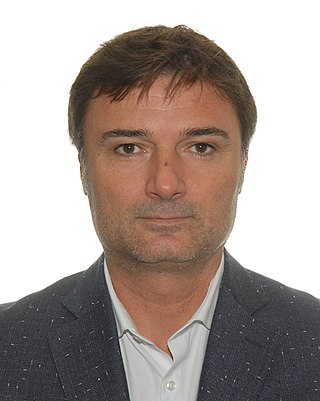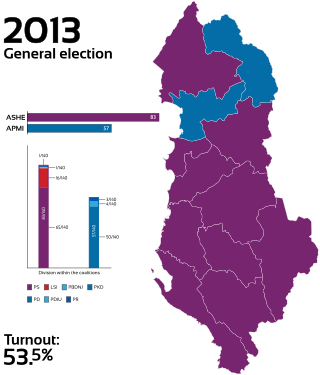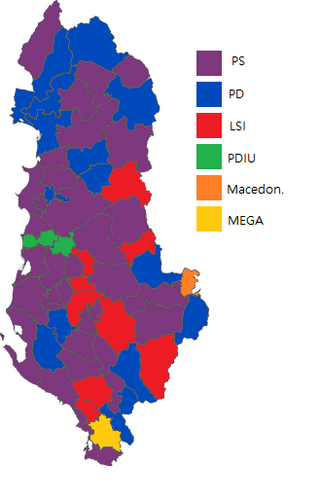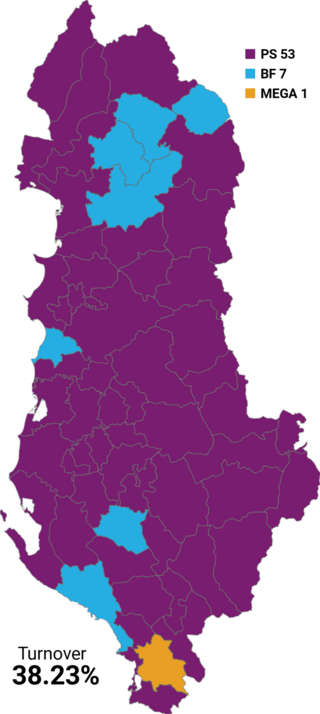Contents
| |||||
| Decades: | |||||
|---|---|---|---|---|---|
| See also: | Other events of 2023 List of years in Albania | ||||
Events in the year 2023 in Albania .
| |||||
| Decades: | |||||
|---|---|---|---|---|---|
| See also: | Other events of 2023 List of years in Albania | ||||
Events in the year 2023 in Albania .

The prime minister of Albania, officially the prime minister of the Republic of Albania, is the head of government of Albania. The office of the prime minister is a core institution in the politics of Albania formed after the Albanian declaration of independence on 28 November 1912. Since that time, the nation has navigated a dynamic political evolution spanning distinct periods, encompassing a monarchy, a communist regime and the eventual democratic order. In 1912, Ismail Qemali was inaugurated as the first prime minister of Albania, guiding the nation toward sovereignty amidst the complex conditions in the Balkans. In 1944, Enver Hoxha implemented a radical change in government, transforming Albania into an authoritarian and isolationist communist regime. In 1991, the nation transitioned into a democracy that marked a notable shift, when Fatos Nano emerged as the first post-communist prime minister of Albania.

Sali Ram Berisha is an Albanian cardiologist and conservative politician who served as the president of Albania from 1992 to 1997 and 32nd prime minister from 2005 to 2013. Berisha serves as Chairman of the Democratic Party of Albania since 2022 and has held the position previously from 1990 to 2013. He also serves as the incumbent Leader of Opposition in the Albanian parliament.

Edi Rama is an Albanian politician, painter, writer, former university lecturer, publicist and former basketball player, who has been serving as the 33rd and incumbent Prime Minister of Albania since 2013 and chairman of the Socialist Party of Albania since 2005. He was appointed Minister of Culture, Youth and Sports in 1998, an office he held until 2000. First elected mayor of Tirana in 2000, he was reelected in 2003 and 2007.

Fatos Thanas Nano is an Albanian socialist politician who served as Prime Minister of Albania in 1991, from 1997 to 1998 and from 2002 to 2005. He was the first leader and founder of the Socialist Party of Albania and a member of the Albanian Parliament from 1991 to 1993 and 1997 to 2009. He reformed the anti-revisionist Marxist-Leninist ideology of the Labor Party of Albania into social democracy for its successor, the Socialist Party. During his leadership, the Socialist Party, as a result of reforms, joined the Socialist International and Party of European Socialists. Nano was a candidate in the 2007 presidential election but did not win. He again tried in the 2012 presidential election, but he did not even qualify as a candidate, because the leaders of parties in Parliament obstructed their respective MPs to elect him as candidate in the elections.

The Democratic Party of Albania is a conservative political party in Albania. It has been the largest opposition party in the country since 2013.

Lulzim Basha is an Albanian politician and the former chairman of the Democratic Party of Albania and the former leader of the albanian opposition.
The fall of communism in Albania, the last such event in Europe outside the Soviet Union, started in December 1990 with student demonstrations in the capital, Tirana, although protests started in January that year in other cities like Shkodra and Kavaja. The Central Committee of the communist Party of Labour of Albania allowed political pluralism on 11 December and the largest opposition party, the Democratic Party, was founded the next day. March 1991 elections left the Party of Labour in power, but a general strike and urban opposition led to the formation of a "stability government" that included non-communists. Albania's former communists were routed in elections in March 1992 amid economic collapse and social unrest, with the Democratic Party winning most seats and its party head, Sali Berisha, becoming president.
In 1991, the Socialist Party of Albania, with specific social democratic ideology took control of the country through democratic elections. One year later the Democratic Party of Albania won the new elections. After 1990, Albania has been seeking a closer relationship with the West. What followed were deliberate programs of economic and democratic reform, but the implementation of capitalism led to the proliferation of pyramid schemes. Chaos in late 1996 to early 1997, as a result of the collapse of these pyramid schemes, alarmed the world and prompted the influx of international peacekeeping forces. In 1995, Albania was accepted into the Council of Europe and requested membership in NATO and is a potential candidate country for accession to the European Union. The workforce of Albania has continued to emigrate to Western countries, especially Greece and Italy.

Enkelejd Alibeaj is a member of the Albanian parliament. He was the minister of justice in Albania from 2005 to 2009. He is a member of the Democratic Party of Albania.

The 2011 Albanian opposition demonstrations were a series of Antigovernment protests in cities around Albania following 18 months of political conflict over alleged electoral fraud by the opposition. A video surfaced which portrayed the deputy prime minister arranging a corrupt deal with the minister of economy. The public outcry over the video resulted in the resignation of the deputy prime minister, Ilir Meta. A demonstration was called by parliamentary opposition parties, which include the Socialist Party and the Unity for Human Rights Party. These were called on 21 January in order to protest the alleged corruption of the Albanian government as well as widespread unemployment and poverty in the country.
The following lists events from the year 2011 in Albania.
The Fino Government better known as the Government of National Reconciliation was a caretaker government that presided over Albania from 13 March 1997 to 24 July 1997, during the Albanian unrest of 1997. It was created as a result of the social, economic, and political turmoil of early 1997, spurred by the collapse of pyramid schemes and the subsequent loss of many Albanians' life savings. This government was formed in the week following the resignation of the government of Aleksandër Meksi on 1 March 1997 by the major political parties of the country with international support. The Government was voted in the morning session at 10:00 a.m. on 12 March 1997, while received the approval of the President Sali Berisha shortly before midnight on the same day.

Parliamentary elections were held in Albania on 23 June 2013. The result was a victory for the Alliance for a European Albania led by the Socialist Party and its leader, Edi Rama. Incumbent Prime Minister Sali Berisha of the Democratic Party-led Alliance for Employment, Prosperity and Integration conceded defeat on 26 June.

Local elections were held in Albania on 21 June 2015. Voters elected mayors, municipal council members, municipal unit mayors and municipal unit members. The Central Election Commission of Albania was responsible for administrating the elections. This provided that the community type of komuna was abolished and at the same time the total number of communities were reduced from 373 to 61 Bashkia. Those entitled to vote elected the executive and legislative representatives of their communities, the 61 mayors (and on the other hand the total of 1595 municipal councils.
Starting from 16 February 2019, the opposition parties organized a series of protests and rallies against the government to demand new elections and the formation of a technocrat government that would ensure the fairness of the electoral process, citing electoral fraud and corruption in the government as the main reasons for the need for change.
Parliamentary elections are scheduled to be held in Albania by June 2025.

The first Government of Prime Minister Sali Berisha was the 63rd ruling Government of the Republic of Albania formed on 8 September 2005. Following the 3 July 2005 election, the Democratic Party formed a center-right post-electoral alliance to make a majority of seats to Parliament and form the government. The alliance consisted of five-center-right parties led by Sali Berisha managed to create a majority of 81 deputies out of 140 in the Assembly. The new government led by Sali Berisha was voted on 8 September with 84-votes Pro, and took oath on 11 September in the presence of the President of the Republic Alfred Moisiu.
In March 2022, the Albanian government imposed price controls in response to protests. In July 2022, peaceful protests were held in Tirana, Albania, against corruption and the cost of living crisis. It was organised by the Democratic Party and was attended by its leader former Prime Minister Sali Berisha. The protestors demanded the resignation of Prime Minister Edi Rama and his government. Price hikes have reportedly made food and energy costs rise.

Local elections were held on 14 May 2023 in Albania. Mayors and municipal council seats were being elected in each of Albania's 61 municipalities.
Events in the year 2024 in Albania.